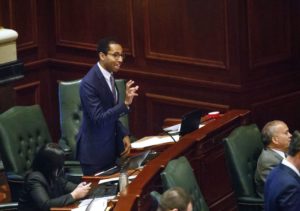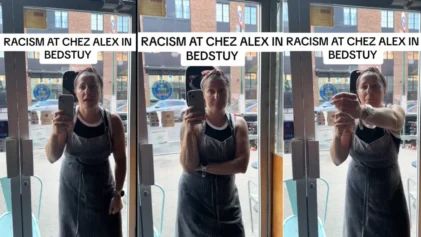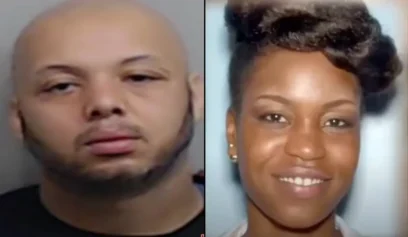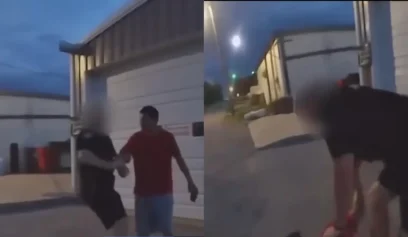
Rep. Christian Mitchell, D-Chicago, spoke out on the House floor about a political cartoon circulated by a conservative Illinois think tank with ties to Republican Gov. Bruce Rauner. The cartoon has triggered accusations of racism and insensitivity.
CHICAGO (AP) — A political cartoon circulated by a conservative Illinois think tank with ties to Republican Gov. Bruce Rauner has triggered accusations of racism and insensitivity in the wake of the deadly attack at a white nationalist rally in Virginia.
The rendering depicted a Black child from Chicago begging for money from a suit-clad white man who has a cigar. It was posted online by the Chicago-based Illinois Policy Institute and meant as commentary on the state’s complicated school funding fight, which the tax policy and research organization says involves practices that are unfair to minorities.
The cartoon prompted a racially diverse group of legislators from both political parties to blast the depiction on social media and stand on the House floor in opposition at the Capitol Wednesday as they gathered to talk about schools. The image was taken down hours later.
“There is a way to make a policy point that’s legitimate, but not in a way that caricatures African-Americans and provokes a dark history,” said Rep. Christian Mitchell, a Black Chicago Democrat who criticized the cartoon in social media posts. “It was extraordinarily hurtful — and hurtful in the context of this week.”
The boy in the cartoon sits on the street, holding a sign that reads, “NEED MONEY 4 SCHOOL.” The man has one pocket stuffed with cash and is pulling out another one that’s empty. In some versions of the cartoon, the man says, “Sorry kid, I’m broke.”
For some, the image of the begging child conjured up Little Black Sambo, a more-than-century-old literary character whose exaggerated features are seen as racist caricatures. For others, it fed into the stereotype of a Black person asking for a handout for a fundamental right such as public education.
Others questioned the timing amid nationwide reflection on race relations after last weekend’s rally in Charlottesville, Va., where violence erupted, leaving a woman dead after a car slammed into counter-protesters.
Policy Institute officials took calls Thursday on Chicago’s WVON radio station, which airs an African-American-oriented talk format. They said the cartoon “told the truth” and that policies heralded by Democrats disproportionately harm disadvantaged students. The institute, which advocates for a school funding overhaul backed by Rauner, called the reaction to the cartoon offensive in the wake of Charlottesville.
“This is a good example when it comes to the very charged subject of racism,” Policy Institute CEO John Tillman said. “There are people who care deeply and there is structural racism. And then there’s people who want to introduce the subject to get political gain.”
He said the cartoon was removed because it had become a distraction.
Capturing race in political cartoons is tricky, considering the history of using skin color in a negative light and to enhance stereotypes. But the job of cartoonists is to poke fun by distorting facial features, especially those of political leaders.
Artists initially struggled to capture former President Barack Obama. Many settled on exaggerating his admittedly large ears, said Amelia Rauser, an art history professor at Pennsylvania’s Franklin & Marshall College who studies race in political cartoons. Choosing a trademark Obama feature focused on him as a person and not a racial caricature, she said.
Rauser said it was easy to see why the image of the contrasting figures, namely the Black child, was offensive to some.
“It’s using these tropes that are so fraught,” she said. “Just the fact that he’s small and given darker skin. It’s a little too extreme, the Sambo stereotype.”
But, she added, it appeared unintended since the cartoonist humanized the child with small details, like putting him in a Chicago Cubs cap and a backpack.
Still, the image put a spotlight on Rauner and his links to the institute. Rauner, a wealthy businessman, donated to the group before he became governor and recently hired several top aides from the organization including his spokeswoman, Diana Rickert, and former Policy Institute president Kristina Rasmussen, who is his chief of staff.
Chicago Mayor Rahm Emanuel, Obama’s onetime chief of staff, issued a joint statement with city school officials accusing the governor’s “brain trust at the Illinois Policy Institute” of contributing to the school funding debate by publishing an “unambiguously racist cartoon.”
Rickert said Thursday that Rauner hadn’t seen the cartoon and wouldn’t comment on it.
“It’s a terrible thing for people to be bringing up now,” she said. “To be accusing somebody falsely of racism, or try to insinuate that people in this office are racist, is disgusting when the country is trying to recover from this tragedy.”
Rauner, who is seeking re-election next year, has largely avoided commenting on national issues, particularly involving President Donald Trump. Rauner won office in 2014 by garnering enough Republican support outside the Democratic stronghold of Chicago. But for the first time Wednesday, he denounced Trump’s comments about Charlottesville, saying they “damage America.”
The governor has clashed with majority Democrats since taking office. Illinois recently ended its budget impasse of more than two years, but lawmakers have to approve a new funding formula for schools to get money this year. Both sides agree Illinois’ 20-year-old way of determining how much school districts get is unfair, but they disagree on how to change it.
The timeline on when public schools in Illinois will get state funding remains in limbo.


